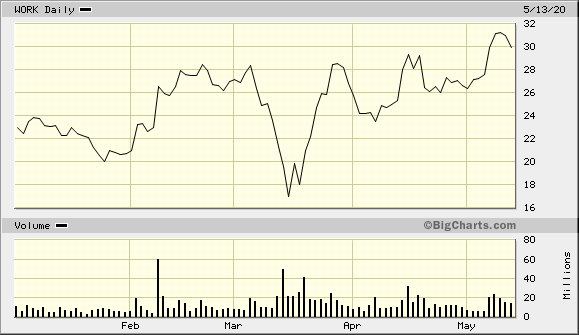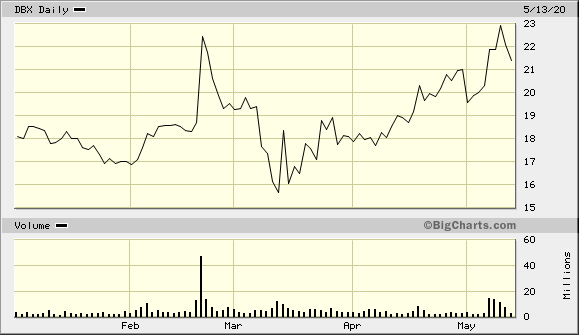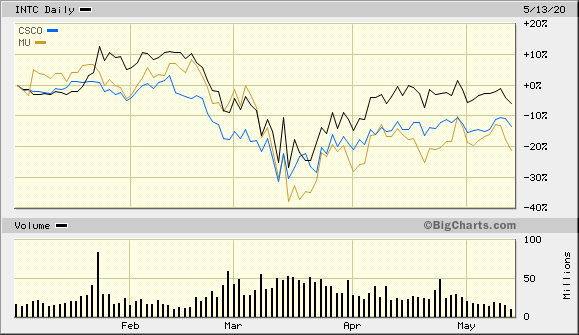No one saw this shift happening so quickly.
But, overnight COVID-19 changed how businesses operate and survive.
Two tech companies that benefited from this shift have cash on hand and could be looking to make a big move.
Slack Technologies Inc. (NYSE:WORK) who went public on June 20, 2019, has built up a massive war chest of funds.
Last month, it raised $862.5 million in new debt to add to its already sizable $768 million in cash on hand.
Slack has a small about of debt and it’s not a capital-intensive business. The company put $49 million to cash to work on capital expenditures for the fiscal year ended Jan. 31, 2020.

Dropbox Inc. (NASDAQ:DBX) has built up its cash position to $1.1 billion with $480 in free cash flow to add to it. CEO Drew Houston has noted that he doesn’t have specific plans for that money. But acquisitions aren’t off the table.

These two companies have done well throughout this work-from-home shift.
Even when America opens up again, the work-from-home shift is here to stay.
The issue they face is the need for more services to offer that will drive revenue.
This could allow them to go on a merger and acquisition spree, but likely going after smaller start-ups.
Now, they could go out and pick off some competitors. But I think there’s a bigger winner in all.
Who Benefits From Cash-Heavy Tech
There’s only one way for companies like these to expand. They have to get more customers. It seems simple. But the problem is, more customers need more resources.
For online service companies like these two, and many others like them, that means storage. Specifically, cloud storage.

Grab a piece of paper and pen to write this down…
Because you’re about to see the name and ticker symbol of the ONLY 5G STOCK every investor should own.
You can get the name and ticker of this company right here, no strings attached. But you better act fast…
Because the Federal Communications Commission, the government agency in charge of 5G, just scheduled a major announcement that would send shares soaring once announced.
Don't miss out. Click Here to Get #1 5G play for 2020 before the next market close.
Already, companies and websites like Netflix, Reddit, Imgur, and Pinterest are among the largest Amazon AWS customers.
Microsoft Azure cloud platform has eBay, Travelocity, and others.
Google’s include PayPal, Target, and HSBC.
This is the most likely place for these cash-rich tech plays to put that capital to work… expanding their cloud resources.
Amazon, Microsoft, and Google are clear leaders here. As they are three of the largest in the business. But that’s not the only way to play this idea.
Backdoor into Cloud Business
The actual platforms might be owned by Amazon Inc. (NASDAQ:AMZN), Microsoft Corp. (NASDAQ:MSFT), and Alphabet Inc (NASDAQ:GOOG). But the hardware that supports them is something else entirely.
For servers, network switches, routers and all the other pieces that make the cloud work, these companies turn to the likes of Intel Corp. (NASDAQ:INTC), Micron Technology Inc. (NASDAQ:MU) and Cisco Systems (NASDAQ:CSCO).
These are the real moneymakers from companies like Slack and Dropbox expanding. And as you can see, they haven’t fared as well. Meaning, they could see an even better post-COVID-19 period.
Now, this isn’t as easy as picking up a few shares of these backdoor plays. You see, these companies have a problem.
All three are badly affected by the trade wars between the U.S. and China. And as we’ve noted in the past, at least for Intel, it has fallen behind its competitors.
So, there’s money just waiting that has to be put to work.
And a great deal of this M&A should start to pick up as we navigate out of this COVID-19 uncertainty.
Whether that’s M&A or on expanding cloud resources, it’s likely too early to really know for sure.
But looking at these backdoor plays might be worth watching. Especially when we get more news on tariffs from China.

Now, this isn’t as easy as picking up a few shares of these backdoor plays. You see, these companies have a problem.
All three are badly affected by the trade wars between the U.S. and China. And as we’ve noted in the past, at least for Intel, it has fallen behind its competitors.
So, there’s money just waiting that has to be spent in a risk-free return market.